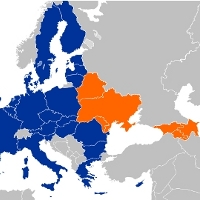Eastern Partnership Reloaded
October 3, 2011 -
Andrew Wilson
-
Bez kategorii

ep_s.jpg
The conclusion of the Eastern Partnership summit can be seen as a test of both of the EU and its new principles of consistency and conditionality. Despite no real policy issues resolved during the summit, its success can be measured by the amount of attention it brought to the region.
The autumn of 2011 is a perfect time to be starting a blog on the New Eastern Europe. The tectonic plates are shifting throughout the region. Putin has announced his comeback as Russian President. The on-off Tymoshenko trial is a mess of Ukraine’s own making. Belarus promises to release political prisoners. The tap was turned on for the first “technical gas” out of Nord Stream on 6 September. Negotiations on Transnistria have restarted in the “5+2” format. Latvia’s election promises one of two possible revolutions: either a government without oligarchs or a partnership with the Harmony Centre Russian party. And, regardless of how the Euro crisis might end, it is worth thinking about the possible consequences for Eastern Europe of a two- or many-speed Europe, of Euro ins and outs, Euros hard and soft, or Euro collapse or re-launch.
All of these subjects will be worth a blog over the coming weeks. But there is no harm in my first post being a Polonocentric look at the Eastern Partnership (EaP) summit, which has just finished in Warsaw. The summit is only the second of its kind, but it is already a traditional test both of the EU and its new principles of consistency and conditionality, and for who’s up and who’s down among the EaP states themselves – a healthy spirit of competition being one of the best potential features of the “new EaP”.
The contrast between Ukraine and Belarus set the stage. Lukashenka was not invited to Warsaw; Foreign Minister Martynow gave way to the Belarusian ambassador; then the Belarusian delegation walked out anyway. The other five EaP states insisted that the EU’s expression of “deep concern at the deteriorating human rights, democracy and rule of law situation” in Belarus should come in a separate statement – which in itself says a lot about problems in the region.
As the EU was tying itself in knots over the political prisoners issue, this was probably a good thing. It saved Brussels from conceding some kind of dialogue just because Lukashenka has “solved” a problem he created himself in the first place, without even restoring the status quo ante. The visit of Bulgarian Foreign Minister Nikolai Mladenov to Minsk in August was too obvious a gamble on a summit “success”. Around the summit, EU leaders were still talking of $9 billion in loans in return for full release of prisoners, but rightly added the condition of free elections, which would mark important structural progress.
Ukraine is becoming a surprisingly similar problem. The EU showed impressive solidarity with relatively united condemnation of the Tymoshenko trial this September, but divisions remain. The EU machinery, including Baroness Ashton, has a natural bias towards maintaining their own negotiating processes over the Association and Deep Free Trade Agreements, arguing that they will provide precisely the kind of transformative power that has been lacking in Ukraine these last twenty years. Politicians in Member States and the European Parliament, on the other hand, see more mileage in defending Tymoshenko’s right to a fair trial, and argue that Ukraine will never transform itself until the politics is right. (Including France, though probably because the French never wanted an agreement in the first place). But the key thing, as with Belarus, is not to be caught out by a Ukrainian two-step, with the authorities in Kyiv simply delaying a verdict, or devising some other form of persecution, until they have the agreement they want.
Moldova and Georgia were promised Deep and Comprehensive Free Trade Area (DCFTA) talks “before the end of the year”, which in Georgia’s case is a slight downgrade on the expectation of immediate commencement, given more than two and a half years of “pre-negotiations” already. Moldova, the “quiet success story”, might have hoped for more, but still has problems of state capture clouding key agreements like the open skies deal.
Turnout at the Warsaw summit was better than at the first summit in Prague in 2009. Angela Merkel was joined by UK Deputy PM Nick Clegg. Sarkozy claims he only missed because he is off to the South Caucasus next week.
The summit was never going to be the place where big changes in policy were decided, but it was good to see some broader discussion of the strategic issue involved, particularly in a good speech by Polish Foreign Minister Radek Sikorski, and not just because he quoted a paper by Nicu Popescu and myself. And there was more politics in the margins than at Prague, with Merkel meeting Yanukovych to speak some plain truths and the EaP five talking more among themselves.
Overall then, the summit can be called a qualified success, precisely because of the temporary political attention. But that attention will need to be maintained if the EU is not to be out-manoeuvred in the coming months.
Andrew Wilson is Senior Policy Fellow with the European Council on Foreign Relations (ECFR). His latest book Belarus: The Last European Dictatorship is available on October 31, 2011.
This week in the East is a weekly commentary by Andrew Wilson for New Eastern Europe.


































